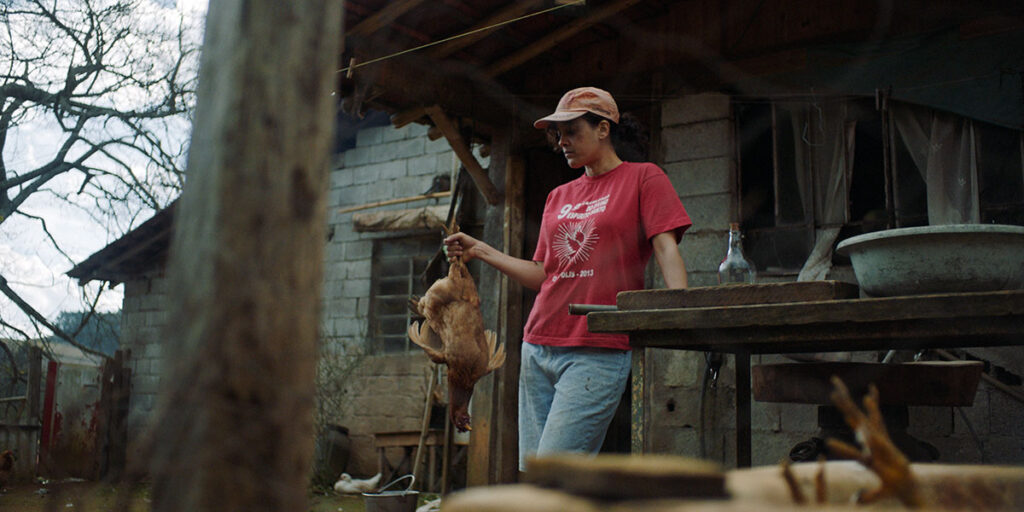While red-carpet galas dominate headlines and social media out of TIFF, the programmers are always careful to program smaller films from all over the world around these events. Sometimes these counter-programmed screenings can produce vastly superior films to the potential blockbusters unfolding at venues like the Princess of Wales Theatre or this year’s newest venue, the Royal Alexandra theatre—lots of fancy names here in Toronto. Two of the films in this dispatch feel like they will struggle to reach an audience beyond the festival circuit even though they’re rich, fascinating dramas. The third could get to a major streamer because of its subject matter and cast/crew lineage but it’s one of this fest’s weaker pieces of work.
One of the best films I’ve seen from the Platform section of TIFF this year is Carolina Markowicz’s “Charcoal,” a sharp, specific thriller that also has a nice undercurrent of dark humor. Markowicz confidently tells a story that film has been doing forever—the stranger who radically upsets a family dynamic—but does so in a way that feels driven by character and setting instead of cliché.
Irene (Maeve Jinkings) and Jairo (Romulo Braga) live in a small village in the Brazilian countryside, away from civilization, where they run a family charcoal business. It’s the perfect place for someone to hide. They go about their business, including raising their nine-year-old son Jean (Jean Costa) and caring for Irene’s increasingly ailing father. His days are quite literally numbered, and so the family considers it when their nurse suggests something remarkable. She works for an Argentinian drug lord who needs a place to hide out. If Irene and Jairo could basically replace the old man with the kingpin, they would have enough money to never worry again. Irene prays on it, wondering about the kindness in keeping an ailing relative alive anyway, especially when God has given them such an opportunity.
In a way that’s never forced, the new arrival in this non-descript home throws the family into chaos. Jairo has a secret affair with a neighbor, and he uses the newfound income in ways that might draw attention in a small community. Irene becomes more confident and outspoken, fascinated by this imposing figure in her relatively dull reality. Even Jean opens up in unexpected ways, getting closer to a criminal lifestyle that now looks appealing to him.
Markowicz takes a potentially dul plotline and elevates it by sticking close to her characters. We come to know Irene—Jinkings is fantastic—and relish in watching her manage the new reality of her existence, going from a dying father to a potential escape from her mundane existence. There are also sharply interesting religious themes in the film, one that culminates in a fascinating ending with one of the best final shots of TIFF so far.

On the other side of the world, the reliable Cliff Curtis—one of those actors you may not know by name but certainly will recognize—stars in Tearepa Kahi’s true story “Muru,” an intense thriller about a violent clash between a Maori community and the armed forces who became convinced they were domestic terrorists. Inspired by not just one violent encounter between these communities, “Muru” centers Taffy (Curtis), a police sergeant who has returned home to what should be a quiet existence in terms of lawbreaking. However, a few of the locals, including a well-known activist named Tame Iti (who plays himself in a powerful performance), have been talking enough about mistreatment from the New Zealand government that they’ve gotten their attention.
Everything changes in this relatively peaceful valley when the authorities enact a raid on the community, looking for Tame Iti and any stashes of weapons. The truth is that Tame Iti has been running a camp to train his people in the case of assault from the powers that be, but given it’s happened to his people before, who can blame him? And when armed men come into the Ruatoki Valley, someone ends up shot, leading to a heightened, simmering dynamic that threatens to explode in widespread violence.
Curtis deftly captures a man caught between his people and his job, but “Muru” is mostly an accomplishment in tension, courtesy of a propulsive pace from Kahi. This is one of those films that slow burns for a little while as it sets up its characters and then unfolds nearly in real-time during the tragic, misguided raid. It’s basically an action movie, and it works well as one, keeping up the pace while never losing the pro-Maori message of the film, one that’s named after a word that means something redress. The opening crawl says that this is not a recreation of what happened but a response. It’s a powerful one.

Finally, there’s Amy Redford’s “Roost,” which plays a little like the 2022 Sundance drama “Palm Trees and Power Lines” but without the conviction of that film’s dramatic purpose. It’s a manipulative thriller with some interesting performances from young stars Grace Van Dien (who fans will remember from the fourth season premiere of “Stranger Things” as the doomed Chrissy) and the always-strong Kyle Gallner, but the script here just never rings true. It all feels manipulative, turning its characters into pawns for a game of sexual chess, and the film’s direction and style don’t have enough strength to overcome a truly weak script.
Van Dien plays Anna, an average girl who has been communicating online with an older boy named Eric (Gallner). Anna knows he’s older but doesn’t quite know that he’s actually 28. Anna is 17. When Eric shows up on their doorstep, Anna’s mom Beth (Summer Phoenix) understandably freaks out, and her cop fiancé Tim (Jesse Garcia) tries to put the brakes on potential disaster. However, there’s a major twist that comes a little before halfway through that turns everything on its head, recalibrating Eric’s motives and the entire thrust of the film.
Once that’s revealed, “Roost” has too few places to go and simply lacks momentum in the second half. Anna becomes too much of a background character in what should always stay her story (even with the twist that brings her mother into the narrative more) and too many scenes consist of on-the-nose, blunt dialogue. No one speaks like the characters in this movie, so often knowing exactly what to say and when to say it. The shame is that Van Dien and Gallner are clearly talented enough for something more subtle. If only “Roost” trusted them to make that movie.












